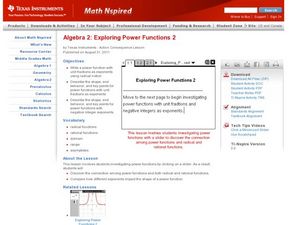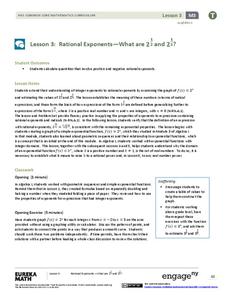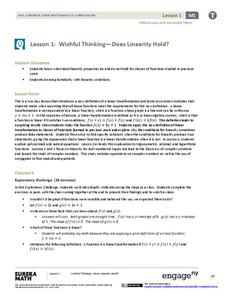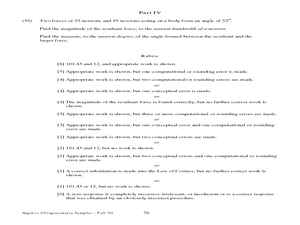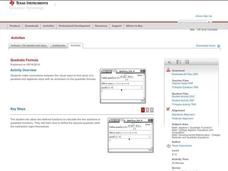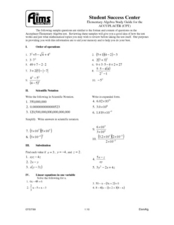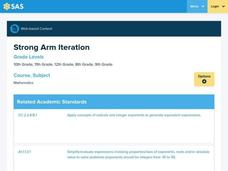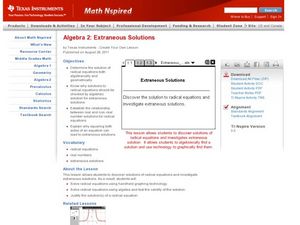West Contra Costa Unified School District
Graph Square Root and Cube Root Functions
Scholars first learn to graph square root and cube root functions by creating a table of values. They then learn how to graph functions from transformation of the graphs of the parent square root and cube root functions.
Curated OER
Exploring Power Functions 2
Young mathematicians learn to write algebraic equations. They solve and graph different polynomial functions with different powers. They then graph radicals and identify the domain and range.
Virginia Department of Education
Radical Equations
Provide students with the skill for how to examine algebraic and graphical approaches to solving radical equations. Learners solve various radical equations involving square root and cube root expressions. They first solve...
Curated OER
Transformations and Exponential Functions
Tenth graders study graphing exponential functions. In this transformations lesson, 10th graders apply inquiry to determine how changes to a parent function affect its graph. Students analyze transformed graphs and generate the function...
Curated OER
Solutions of Radical Equations
Pupils define functions to be graphed using the Y= key and how to set up a standard viewing screen using Zoom 6. They complete a lab sheet for each of the three problems attached, completing the assignment outside of class.
EngageNY
Graphing Cubic, Square Root, and Cube Root Functions
Is there a relationship between powers and roots? Here is a instructional activity that asks individuals to examine the graphical relationship. Pupils create a table of values and then graph a square root and quadratic equation. They...
Curated OER
Power Function Inverses
Pupils graph polynomial functions and analyze the graphs. They identify the inverse of the functions and find the domain and range. Learners will then label the functions as one to one and use the horizontal and vertical line test to...
Curated OER
Exploring Power Functions 1
Learners describe the end behavior of polynomial functions. Pupils relate the behavior of the graph to the exponent of the graph. They differentiate graphs with odd-exponent and graphs with even exponents.
Curated OER
Model Data with Quadratic Functions
Students model data using quadratic equations. In this algebra lesson, students simplify and factor quadratic equations. They graph the function using collected data and analyze the parabola.
Curated OER
Radical Transformations
Students transform the square root function graphically. For this transforming the square root function graphically lesson, students use their Ti-Nspire to change the a, b, and c values of th square root graph. Students...
Curated OER
Introduction to Inverse Functions
Learners investigate patterns of inverse functions. In this algebra lesson, students represent functions with the calculator and on paper. They analyze their data and draw conclusions.
EngageNY
Rational Exponents—What are 2^1/2 and 2^1/3?
Are you rooting for your high schoolers to learn about rational exponents? In the third installment of a 35-part module, pupils first learn the meaning of 2^(1/n) by estimating values on the graph of y = 2^x and by using algebraic...
Virginia Department of Education
Curve of Best Fit
Which function models the data best? Pupils work through several activities to model data with a variety of functions. Individuals begin by reviewing the shapes of the functions and finding functions that will fit plotted data points. By...
EngageNY
Wishful Thinking—Does Linearity Hold? (Part 1)
Not all linear functions are linear transformations — show your class the difference. The first lesson in a unit on linear transformations and complex numbers that spans 32 segments introduces the concept of linear transformations and...
Curated OER
Functions
Students explore a variety of functions. They recognize and describe functions and use linear functions to describe situations. Students find the domain and range of linear functions and graph rational expressions.
Curated OER
Parent Functions Reference
In this functions worksheet, students explore the graphs of fifteen parent functions. This worksheet is meant as a reference for students.
Curated OER
Scoring Guide for the Algebra 2/Trigonometry Test Sampler
High schoolers take an Algebra II/Trigonometry sample test. In this Algebra II/Trigonometry sample sample test activity, students take a sample test for Algebra 2/Trigonometry. High schoolers solve 39 multiple...
Curated OER
Quadratic Formula
Mathematicians determine the solutions of a quadratic function by looking at a graph. They use the quadratic formula to solve quadratic functions on their Ti-Nspire.
Curated OER
Elementary Algebra Study Guide
Middle and high schoolers solve problems involving linear equations, inequalities, quadratics, radicals, systems of equations, exponents, and polynomials. Many of the problems encompass a review of Algebra I. This 10-page worksheet...
Willow Tree
Linear Relationships
There's just something special about lines in algebra. Introduce your classes to linear equations by analyzing the linear relationship. Young mathematicians use input/output pairs to determine the slope and the slope-intercept formula to...
Curated OER
Ellipses (Part 1)
Students work with Ellipses in Algebra II. In this algebra lesson, students solve an equation with a radical expression. They graph ellipses and write an equation for them.
Curated OER
High School Examination: Algebra 2/Trigonometry
In this high school worksheet, students solve problems involving angles, functions, square roots, and sequences. They read word problems, write equations, and then solve them. This 28-page worksheet contains 39 problems.
Curated OER
Strong Arm Iteration
Students solve exponential functions and inequalities. In this algebra lesson, students find the roots of equations and use it to graph and evaluate exponential functions. They simplify exponents using the law of exponents.
Curated OER
Extraneous Solutions
Learners find the roots of quadratic equations. In this algebra lesson, students solve radical equations and identify the positive and negative roots. They graph and analyze their functions.

